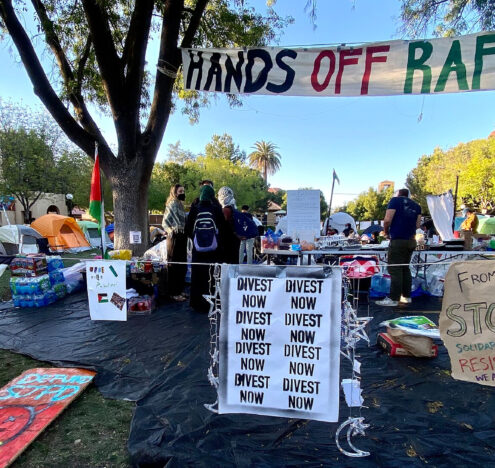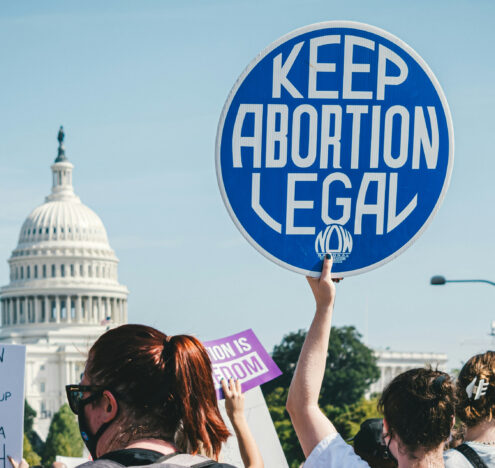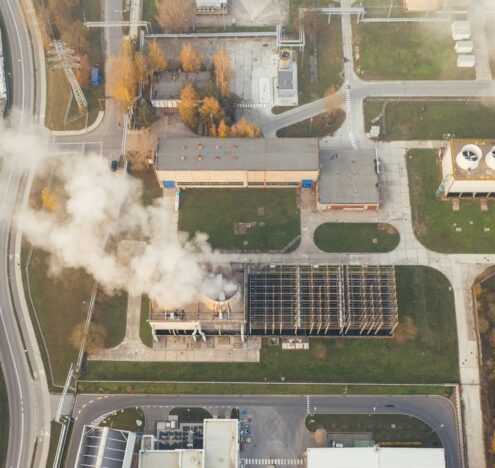Two of the gravest threats to human health and survival – nuclear weapons and the climate crisis – are interconnected. Right now, the risk of either a nuclear-driven climate disaster or climate-driven nuclear disaster is particularly high. Either could cause one of the worst global health crises imaginable. In fact, the Bulletin of Atomic Scientists’ Doomsday Clock, which analyzes both threats, puts us at just two minutes to apocalypse.
It feels like there is a ridiculously over-the-top scheme by a white-cat-stroking James Bond villain to undermine international cooperation and hard-won progress and cause nuclear war and climate destruction.
But who needs Dr. No? We’re doing a fine job ourselves by withdrawing from critical international arms control agreements, re-escalating tensions that could provoke nuclear conflicts, and being so obstinately inactive on the climate crisis that throwing henchmen into a shark-infested pool looks empathetic by comparison.
The United States has celebrated its withdrawal from the landmark Intermediate-Nuclear Forces Treaty by testing an intercontinental ballistic missile the treaty previously forbade. A new nuclear arms race? Bring it on! This high-stakes game of chicken has no winners, but we’re happy to ride on this mutually-assured collision course straight into oblivion.
This high-stakes game of chicken has no winners, but we’re happy to ride on this mutually-assured collision course straight into oblivion.
We’re not doing much better on the climate front. The recent UN Framework Convention on Climate Change (COP25) negotiations, meant to spur international commitments beyond the Paris Climate Agreement, ultimately failed to call for bold action. The very nations and communities set to face the worst impacts of climate crisis were shut out, while fossil fuel corporation sponsors of COP25 didn’t just have a seat at the table — they seemed to own the table.
You don’t have to be an expert to appreciate how high the stakes are. Climate change is already fueling mass migration around the world, which carries enormous political and global security implications. Further, climate change can trigger or exacerbate international conflict, particularly in regions at high risk of resource conflict, which could lead to nuclear conflict. Thanks to escalating tensions between nuclear-armed countries, US withdrawal from vital international arms control treaties, and foreign policy dictated by tweet, the risk of nuclear conflict is already high. Add the climate crisis, and we have a nuclear emergency waiting to happen.
Conversely, a nuclear disaster could provoke a climate disaster. As PSR Nuclear Weapons Abolition Program Director Martin Fleck noted in his recent op-ed for The Progressive, current climate model simulations show that smoke in the stratosphere due to fires from a nuclear war involving less than 1 percent of the world’s arsenals — targeted on cities — could trigger a global climate cooling so severe that it could lead to worldwide failure of agriculture production (think sustained sub-zero temperatures in grain-growing regions around the world for ten years), putting up to two billion people at risk of starvation and death.
Nuclear winter would also create a global mass health emergency. A major October 2019 study by leading researchers examined a potential nuclear exchange between India and Pakistan. They confirmed the horrific widespread effects that could result from the climate impacts of a nuclear war, and predicted that such a nuclear exchange could “double the yearly natural global death rate.”
We cannot ignore the threats of nuclear-driven climate disasters and climate-driven nuclear disasters. We must pursue robust, comprehensive international agreements that put us on the path to prevent nuclear and climate disasters rather than instigate them. Extending the New START Treaty, reentering critical international arms control agreements like the Iran Deal and the INF Treaty, and strengthening the commitments outlined in the Paris Agreement to limit global warming to 1.5 degrees Celsius would be a great place to start.
The fate of humanity is at stake — will we let the Bond villain win?
Olivia Alperstein is the Media Relations Manager for Physicians for Social Responsibility.





















